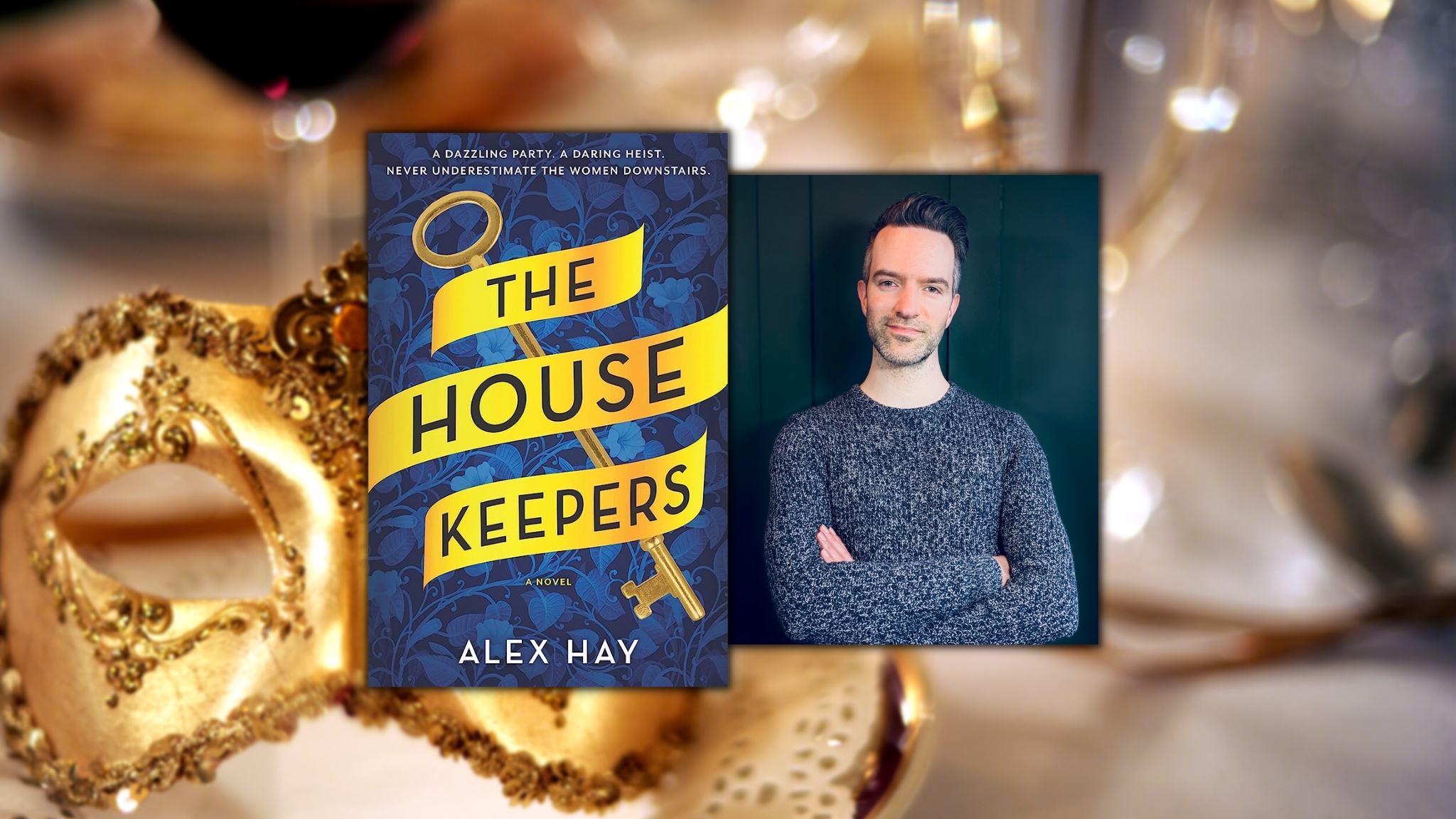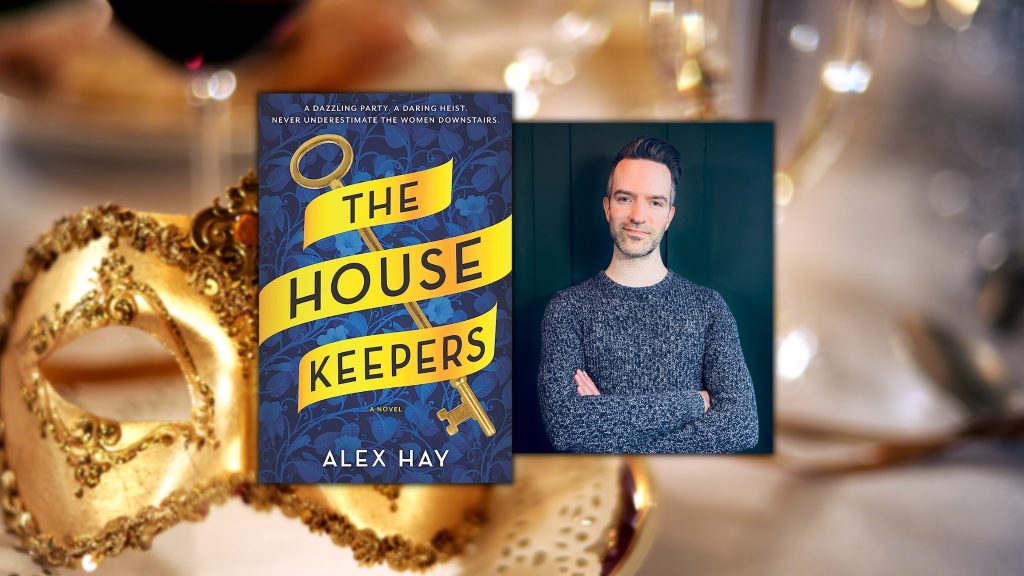
“I hope you’re watching from heaven, she said inwardly, looking at the portrait. Or wherever you’ve landed. I hope you see it all play out. I hope they pin your eyes open so you have to watch what I do to this house.”
London, 1905. The woman talking in Alex Hay’s The Housekeepers (Graydon House) is Mrs. King, who runs the staff of an enormous, sprawling house in Park Lane. The owner of the house is newly deceased, and his calculating daughter is planning to throw a ball in order to catch an appropriate husband: “She wished to operate at the very top of the ladder, right up in the heavenly heights of society: among cabinet ministers, earls, dukes, princes. She just needed to leverage herself properly … She needed to catch the world’s attention. Now was the moment.”
It is Mrs. King’s moment, as well. She has been planning it for the better part of a month, but really it has been building for years. She is going to clean this house out, “strip it right down to the bones.” It is not about the money, although that is welcome, it’s about a very personal revenge, and she has been busy recruiting women with similar backgrounds and singular abilities into the household, instructing them carefully, preparing the ground.
But you can only prepare for so much: “Sometimes in the dark of night, Mrs. King thought about the one thing that frightened her about her plan. Other people. All their strange little fears, their jealousies, their persistent needs.”
And she is right to worry. There is so much she doesn’t know…
The Housekeepers is an exhilarating novel, a heist story brimful with conflicting currents and dark secrets all up and down its remarkable cast of characters, filled with twists, surprises and knife-edge commentaries about power, gender and class. You’ll enjoy yourself immensely — and find more than a little to think about.
“I’d been itching to write a heist novel, because I love that plot structure,” says Alex Hay. “It gives an author so much to play with — gathering a team, setting up a clear goal, throwing in various obstacles along the way — and I knew it would be both fun and a structural challenge. I was also longing to set a story in London in the 1900s — to play with the decadence and glamour (and corruption) of that era. So, starting this book was all about sticking those two components together: a rackety, high-stakes scheme set within the boudoirs and ballrooms of London high society at the turn of the twentieth century. But as the story evolved, I began pulling on more threads, and found a dark heart lurking at the center of the plot — a whole host of secrets underneath all that gloss.
“I planned this novel to within an inch of its life, writing a detailed outline for each scene… but as the saying goes, the tale grew in the telling, and the story shifted hugely with each draft. Some moments in the plot hinged on key discoveries in the research stage. For example, I loved reading about bonkers nineteenth-century inventions, such as Parenty’s Smoking Machine, a device that was designed to simulate the exhalation of cigarette smoke. It proved a rather useful tool when I (and my gang!) needed to create the impression of a fire to hurry the plot along.
“Plus, this is a book about a robbery, so I had to be absolutely clear what my gang was trying to steal! I pulled some brilliant archive editions of the Illustrated London News, which contained in-depth descriptions of sumptuous mansions on Park Lane. I love books about the period and so it was a joy answering questions such as: what did the furniture look like? What type of paintings were hanging on the walls? What were the carpets like; how about the doors? I referred to old household guides to check the details about the servants’ routines — and to find menus for some of the sumptuous feasts! A big discovery was just how many of those extraordinary houses were lost to bombing or redevelopment: you see the ghosts of those old properties, on the corner of one or two of the great London squares, but many of the rest exist only in sepia photographs and archive accounts.”
All the rest came from his imagination: “Setting and the overarching concept tends to come first. The beauty of a heist plot is that it has clear movements — gathering a team, unveiling a plan, pulling off the job itself — and this created the framework to throw in all the things I love to read (and write) — big houses, bad families, loyalty, jealousy, eccentricity, a tinge of the gothic, a little nineteenth-century melodrama… Once the story is flowing your fingers start to fly over the keyboard, and I find that the rhythm and texture start to emerge organically. For example, certain images were shimmering at me all the way through this story: dice, cards, satin, silk, stucco, gilt, birds, gloves, beeswax, glass… Players shifting, sidling around one another; opening up games of luck and chance… And thus themes began weaving their way onto the page: wealth, freedom, ownership, dignity. It is a process of thinking and crafting and testing and making decisions and then of course trying to shape that into a coherent whole.”
He was also helped by the literary influences that shaped him:
“I can vividly remember learning to read, being able to place letters together, being able to read street signs. It was a remarkable feeling, a huge adventure. Reading has always been one of the great joys in my life, and it has always felt like a precious gift: being able to read well and for pleasure opened the whole world up for me. Helping children to read with confidence makes all the difference to their later lives.
“When I look back on the books I read and loved as a child, there are so many rich images fixed in my mind from The Princess and the Goblin by George MacDonald, or The Magician’s Nephew by C.S. Lewis, or The Story of the Amulet by E. Nesbit. I can remember the smell and texture of those books so vividly — the lime-yellow cover of one, the slippery sheen of the pages of another… I’m sure my love for reading and writing historical fiction comes from this early reading.
“I adore Ruth Rendell for her ruthless, original, prose; I marvel at Kate Atkinson for the wonderful shape of her stories, with all their ripples and ruptures and turns. I think A.J. Pearce, author of Dear Mrs. Bird, is simply wonderful: her books are funny, sad, clever; she really is so good.”
Did any of this help when it came to completing his own book and finding a publisher for it? Alex Hay tells the story:
“I’ve been writing for as long as I can remember, stapling together my first ‘books’ from the age of six, writing vast (and always unfinished) gothic novels in my teens. I paused writing while I was at university but once I moved to London to work, I started again in earnest. By 2015, I set myself what felt like a big, audacious goal: I would write a novel every year until I got an agent. In truth it took six years, and I wrote four (with several unfinished novels falling by the wayside, mostly abandoned at the tricky 30,000-word mark!). The first three books were all rejected by agents, but that was okay — I knew they would be; I felt it was all part of the process and that this was really an apprenticeship, a process of trying to learn this wonderful, mind-bending, sometimes-agonizing craft.
“When I lit on the idea for The Housekeepers, I felt the most wonderful spark of excitement. Planning it was grueling at times, but the writing and editing were a joy. I had the idea in the summer of 2020, in the midst of the Covid pandemic, and I was writing it all through that long hard winter of 2020-21. It was an absolute tonic: a joyful world to dive into.
“I went on submission to agents in November 2021 and received several requests for the full manuscript — and several rejections, too, so I had to hold my nerve. If The Housekeepers hadn’t found an agent, then I would have gone back to the drawing board. But it would have been tough: by then I really, really wanted this book to make it.
“Then I was longlisted for the Caledonia Novel Award, a competition for unpublished writers — and things shifted; more agents requested to read the full manuscript. Next thing I knew, I was shortlisted for the prize… then, wonder of wonders, I won. It was a magical moment. Life-changing, really. I met two brilliant agents and signed with the marvelous Alice Lutyens. Together we worked at breakneck speed to edit the book and get it into shape for submission to editors.
“In March it went out on submission to editors. I knew it could take a long time to hear any news. But a few days later, I was in a work meeting, blissfully unaware my agent was trying to call me to tell me we had an offer.”
Here’s what happened then, as he has described elsewhere:
“I have a text from Alice that I will treasure forever, followed by four or five missed calls, saying ‘PICKK UPPPP YOOOURR PHONE!’ By the time we finally spoke, we had to move fast. And honestly? I think I went into a sort of shock. I remember feeling that things had just become very, very serious, and asked about 5,000 questions (sorry, Alice). There were a couple of points to be ironed out, and so I thought we probably wouldn’t hear anything else that evening, and decided to make dinner (terrible timing). Alice called with an update! Promptly burned everything. Husband fuelled me with prosecco. Paced endlessly around the room. Exchanged many texts with Alice. Final one said: ‘Done. CONGRATULATIONS!’ Had a little cry. Typed lots of jumbled FEELINGS in reply. Then literally flew to the pub. Such a momentous and incredible evening, I’ll never forget it.”
Next up for Hay is another novel “set in the same world, but starring a fresh cast and a new dastardly scheme.” If it’s anything like this one, there’ll be more momentous and incredible evenings to come.

